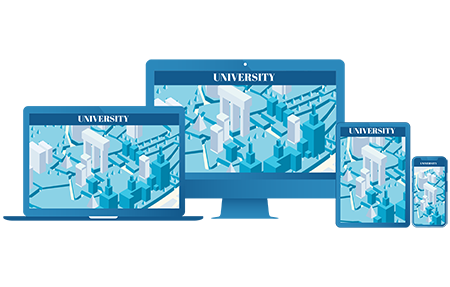
Planning for College
Some thoughts for the starting school year

Whatever your destination, college can help you get there — even if you don’t know where “there” is yet.
Consider your interests and goals
You may already have some ideas about what you want to pursue in college. Let your Personalized Learning Plan in Xello be your first stop to help you!! It's important to start this process of self-reflection. Also reach out to your school counselor, teachers, parents, and other trusted adults in your life for guidance.
Starting to think about college early gives you two main advantages. First, you have time to change your mind and adjust your plans accordingly. Second, you can select high school courses and extracurricular activities that help make you a more competitive applicant for your target colleges.
Prepare academically during high school
High school is the time to start preparing for college.
Your school counselor, your parents, and your teachers are your best resource when it comes to selecting the right courses for you. Each student is traveling a different path so talk to those who know you to help you make the best decisions. Here are a few things to keep in mind.
- Challenge yourself - don't take the easy way out (not even your senior year!)
- Explore - high school is a time to try new things to help you discover your interests and talents.
- Develop your passion- Consider taking multiple courses in this area throughout your high school career to build your knowledge and skills.
- Meet requirements - make sure the courses you take meet the graduation requirements.
Types of colleges
While all accredited colleges award degrees and offer similar services, the type of school you attend can impact how much you pay for your education, which programs of study you have to choose from, and your overall college experience. Here are the different types of colleges to help you distinguish which one may suit you best:
4-Year Public College or University
All states have public colleges or universities and provide residents of that state with a quality education, typically at a lower cost than private schools. Out-of-state students may apply, but out-of-state students typically pay a significantly higher tuition rate than in-state students. Public four year colleges and universities offer Bachelor degree programs. These colleges and universities may also offer degrees to pursue a Master's or Doctorate degree. Examples of public colleges in Wisconsin would be the University of Wisconsin - Madison, University of Wisconsin - Milwaukee, University of Wisconsin - Oshkosh, etc.
4-Year Private College or University
While having similarities, private colleges and universities usually cost more than public schools. Private colleges and universities offer additional benefits. Depending on the institution, students may have access to more undergraduate research opportunities, world-renowned professors, and additional networking opportunities. Private schools tend to have smaller class sizes in a more intimate academic setting. Private four year colleges and universities offer Bachelor degree programs and may also offer degrees to pursue a Master's or Doctorate degree. Examples of private colleges in Wisconsin would be Concordia University, Alverno College, St. Norbert College, etc.
2-Year Technical (Trade) or Community College
Trade schools offer a more direct pathway for students to enter the workforce as students get trained in a specific trade for a specific field. Students generally take courses only in their field of study and possibly one or two English and math courses. Benefits can include lower tuition costs, faster graduation timelines, and the opportunity to acquire real-world experience. Community or Technical colleges tend to be more local, therefore allowing you to live at home with your family. Technical or Community college may also appeal to those who are undecided about their career or major. Some students choose to attend technical or community college to complete their general education requirements before transferring to a four year college/university to earn their bachelor's degree. Technical or Community colleges award mainly associate degrees and certificates.
Examples of Technical or Community colleges in Wisconsin would be Fox Valley Technical College, MATC, Madison College, etc.
For-Profit School
A for-profit college is a college owned and operated by a private company or business with the main goal being to generate money. The advantage to this type of school is higher acceptance rates, flexible class offerings, and more of a focus on skills based training. Examples of this type of school in Wisconsin would be Bryant and Stratton, Globe University, etc.
Choosing a College
Here are some factors to consider as you begin your college search:
- Majors/Programs of study: What do you want to study in college? Answering that question is the fastest way to narrow your college search. Having a general idea of what you want to study before you pick your college can make the process easier, but you do not need to know your exact major. Students interested in unique majors like video game design will find that some schools do not offer courses in their field. For students planning to pursue popular majors like business, nursing, and psychology, check school rankings in those field or consider other aspects of the college to weigh on your decision.
Size: Larger schools usually have more classes and activities, but they also have larger classes, which can mean less one-on-one time with instructors. Small schools offer more individual attention and often a better chance to get to know your professors on a personal basis, but they may not offer the same amount of courses or activities. It can also be easier to get to meet people on a smaller college campus than in a larger university.
- Location: A big factor in deciding on a college can be how close or far away the campus is from your current home. Some campuses may be in a more rural setting and other will be in larger cities. Which one is better for you will depend on your personality and the type of extracurricular activities you prefer to spend your time on. The highlight of rural campuses is that they offer plenty of opportunities to indulge in outdoor activities and a quieter lifestyle in a closer community. Urban campuses offer access to what big city has to offer
- Cost: Ensure the college you choose to attend is worth the time and money you'll be investing.
Make sure the school fits your budget after accounting for fees and living expenses.
Additional expenses may be room and board, transportation, extracurriculars, and entertainment. Financial aid such as scholarships, loans, grants, etc., can help lower the costs.
- Community/Diversity: The school spirit and general atmosphere will set the tone for your experience. Students feel more at home and at ease when they are able to connect with classmates who share similar religious, ethnic, or cultural backgrounds.
- Housing: If a student will be attending a four year university or college, there may be a requirement for first-year students to live on campus. Campus housing may be a traditional style residence hall with single, double or triple rooms and shared hall bathrooms. Many colleges and universities now offer suites or apartment style living arrangements as well.
- Extracurricular activities/Clubs/Sports: Large state schools could have hundreds of student-run organizations but small private colleges might only offer twenty or thirty. It comes down to your interests and what you’re looking to gain from joining a club or organization.
One of the best ways to find your college fit is to go on a campus tour. Experiencing the actual campus, its surroundings and its students, can help you picture yourself there. If you are unable to physically attend campus, check out the link to see if your campus has a virtual tour option.
Understand the cost of college
Tuition is the biggest college expense. Financial aid helps students and their families pay for college. It can cover a range of educational expenses, like tuition and fees, room and board, books and supplies, and transportation.
Financial aid comes in many forms. The most important first step you should take when figuring out how to pay for college is to fill out the Free Application for Federal Student Aid, or FAFSA. This form will determine your eligibility for financial assistance like federal loans, grants, work-study benefits and even some merit aid.







